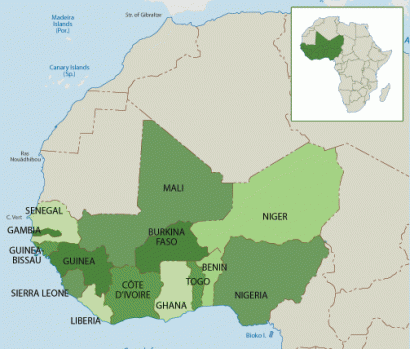
This was announced at a regional workshop on small scale hydro power that ended in Monrovia on 20 April. The five-day event was organized by ECREEE, in collaboration with UNIDO, the World Bank, and the Government of Liberia, and supported by the Austrian Development Cooperation and the Spanish Agency for International Cooperation (AECID).
The Euros 5 million programme will be implemented between 2013 and 2018, and will “help develop local capacity, share knowledge and hydrological data, and development policies and financial schemes”, said ECREEE. It will also promote investment for at least 60 hydro sites in West Africa and help establish a network for the local development, construction and maintenance of small hydro plants, and the production of turbines and spare parts.
The event was attended by some eighty experts from thirteen ECOWAS countries.
Small hydro in Sierra Leone
Meanwhile, UNIDO’s Director-General, Kandeh K. Yumkella, joined Sierra Leone’s President, Ernest Bai Koroma, recently in laying foundation stone for small hydro plant in Sierra Leone.
Once operational, the hydro plant on the Bankasoka river at Port Loko town, developed by UNIDO together with the Government of China, will bring immediate benefits to the local community, including in such areas as irrigation, sanitation standards, drinking water, and will boost small and medium businesses.
The fact that the hydro plant is located within the community means a direct involvement in the project by locals and lower costs. The technological approach used in Port Loko is likely to be replicated in other parts of Sierra Leone, with a potential contribution of several hundred megawatts in the immediate future.
"Our rivers will produce green, renewable and sustainable energy, giving us hope that economic success and national security will be ours for years to come,” said President Koroma. He added that it was time for “energy freedom” and that energy access was not “just about lighting a dark room. It’s about the freedom that energy gives us. Energy access forms an integral part of Sierra Leone’s overall transformation and poverty reduction strategy, and it is one of the top priorities on the government’s agenda for change.”
Director-General Yumkella said he was confident that "small and micro hydro plants in rural areas of Sierra Leone will help improve access to modern energy services, boost market activities and irrigation." He added that UNIDO was currently working on a feasibility study for a 10 megawatt hydro project linked to Njala University in the Moyamba District. The S dollar 32 million project would be funded by the Global Environment Facility (GEF).
For additional information:

